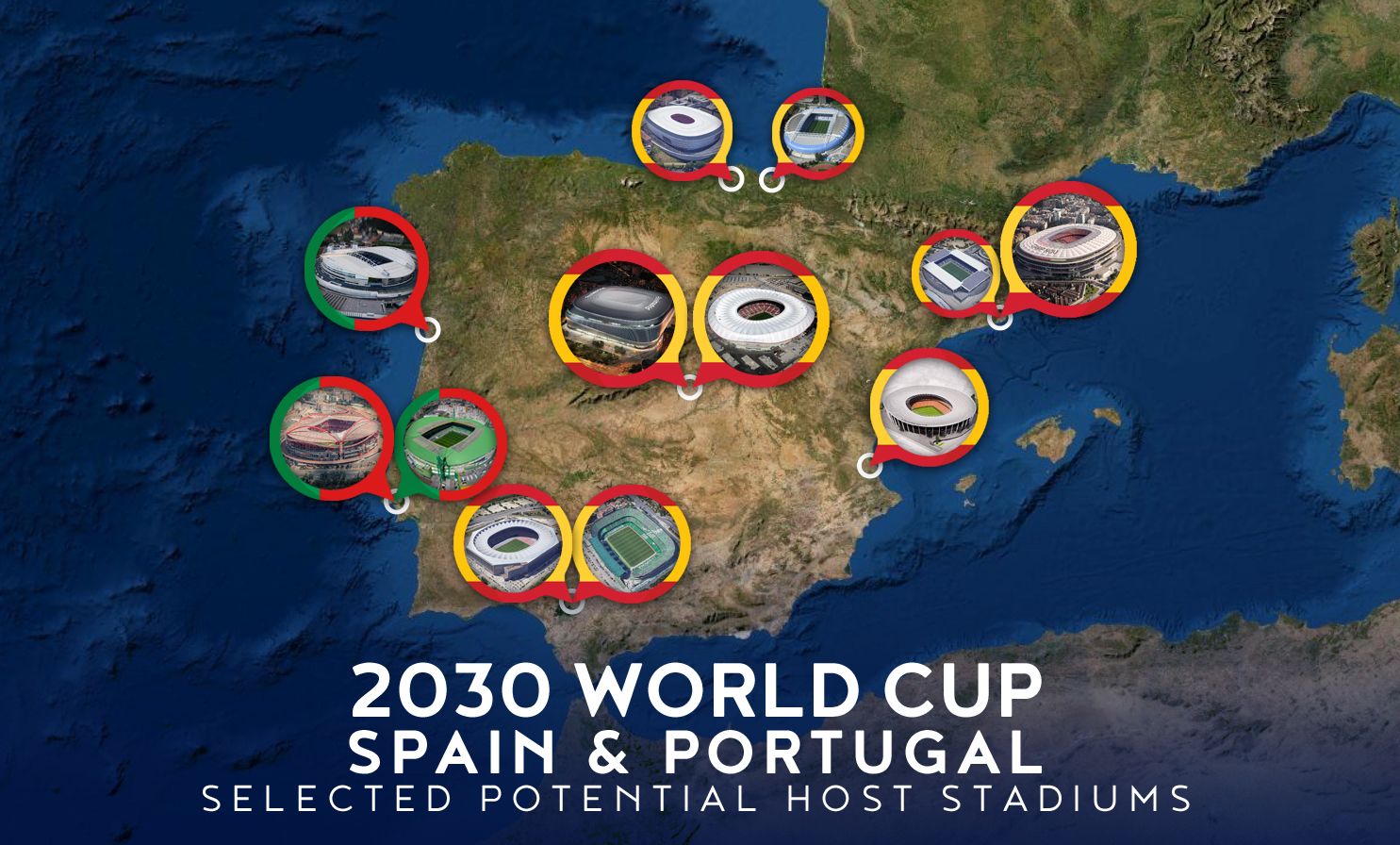The 2030 World Cup: Unveiling the Host Cities of the Future promises a tournament unlike any other. From cutting-edge stadium designs incorporating sustainable technologies to the potential for augmented reality to revolutionize the fan experience, this global event is poised to redefine what’s possible. The selection of host cities will be crucial, impacting not only the tournament’s success but also the economic and social fabric of the chosen nations.
A rigorous evaluation process, factoring in infrastructure, political stability, and environmental considerations, will determine which cities will have the honor of hosting this pivotal event.
This in-depth analysis examines potential host nations, comparing their strengths and weaknesses across various key criteria. We delve into the projected economic impact, explore innovative technological integrations, and assess the social and environmental implications of hosting the World Cup. The logistical challenges and security measures necessary for a successful tournament are also carefully considered, providing a comprehensive overview of the multifaceted preparations required for this monumental event.
Potential Host Cities: A Global Overview
The selection of host cities for the 2030 World Cup will be a crucial decision, impacting not only the tournament’s success but also the economic and social landscapes of the chosen nations. Several factors, including existing infrastructure, political stability, and economic capacity, will heavily influence FIFA’s choice. This section provides an overview of potential host cities, considering their strengths and weaknesses.
Potential Host Nations Comparison
Five potential host nations are considered here, with a focus on their capacity to host a successful World Cup. The assessment considers stadium capacity, existing infrastructure, and political stability.
| Nation | Stadium Capacity (Average) | Infrastructure Score (1-10) | Political Stability Rating (1-10) |
|---|---|---|---|
| United States | 60,000+ | 8 | 9 |
| Spain/Portugal | 50,000+ | 7 | 8 |
| Uruguay/Argentina/Paraguay | 40,000-50,000 | 6 | 7 |
| Morocco | 45,000+ | 7 | 6 |
| England | 60,000+ | 9 | 9 |
Note: These scores are subjective estimations based on publicly available information and expert opinions.
Economic Impact on Top Three Potential Host Cities
The economic impact of hosting the World Cup can be substantial. For the top three potential hosts (United States, Spain/Portugal, and a joint bid from South American nations), the benefits could include increased tourism, infrastructure development, and job creation. However, potential costs related to security and infrastructure upgrades must also be considered.
For example, the United States, with its extensive existing infrastructure, could experience a significant boost in tourism and related revenue. Spain and Portugal, with their existing footballing culture, could see a surge in international visitors and investment in stadium upgrades. A joint South American bid would likely focus on regional development, leveraging the tournament to improve infrastructure across multiple countries.
A detailed economic impact assessment would be needed for each specific bid to provide precise figures.
Technological Advancements in the 2030 World Cup
The 2030 World Cup is poised to showcase significant technological advancements, transforming both the fan experience and the operational aspects of the tournament.
Augmented and Virtual Reality Enhancements
Augmented reality (AR) and virtual reality (VR) technologies are expected to play a major role in enhancing fan engagement. AR applications could overlay real-time game statistics and player information onto a viewer’s screen, while VR could provide immersive experiences, such as virtual stadium tours or 360-degree replays of key moments. Imagine fans at home feeling as though they are sitting in the stadium, experiencing the atmosphere and excitement firsthand.
Innovative and Sustainable Stadium Designs
Stadium designs are likely to incorporate sustainable practices and cutting-edge technologies. For instance, designs might include solar panels integrated into the roof structure, rainwater harvesting systems, and energy-efficient lighting. Visualize stadiums with retractable roofs that adjust to optimal sunlight levels, reducing the need for artificial lighting. The use of recycled materials in construction would also be a key aspect of sustainable stadium design.
AI in Refereeing and Fan Safety
Artificial intelligence (AI) is poised to revolutionize refereeing and fan safety. AI-powered systems could assist referees in making more accurate decisions by analyzing video replays in real-time, reducing the potential for controversial calls. AI could also be used to enhance fan safety by monitoring crowds for potential security risks and identifying individuals who may pose a threat. This would involve analyzing crowd density, movement patterns, and facial recognition data.
Social and Cultural Impacts
The World Cup presents a unique opportunity to celebrate the cultural diversity of the host nation(s) and promote positive social change. A well-planned marketing campaign and targeted social initiatives can maximize the tournament’s positive impact.
Marketing Campaign: Celebrating Cultural Diversity
A successful marketing campaign would showcase the host nation’s rich cultural heritage through vibrant imagery, music, and storytelling. This would involve highlighting local traditions, arts, and cuisine, creating a sense of excitement and anticipation among fans worldwide. The campaign would aim to build a global narrative around the chosen nation’s unique identity and cultural tapestry.
Social Initiatives: Community Engagement and Sustainable Development
- Investing in local community development projects, such as sports facilities and educational programs.
- Promoting sustainable tourism practices, minimizing the environmental impact of the event.
- Creating job opportunities for local residents through volunteering and employment programs.
- Implementing initiatives to promote social inclusion and address inequality within the host community.
Promoting Social Inclusion and Addressing Global Issues
The World Cup can be a platform to address pressing global issues, such as climate change, inequality, and discrimination. By incorporating sustainable practices and promoting social inclusion initiatives, the tournament can serve as a catalyst for positive change. For example, the tournament could highlight the importance of environmental sustainability through initiatives promoting renewable energy and waste reduction. The inclusion of diverse teams and fans could send a strong message of global unity and understanding.
Environmental Considerations: The 2030 World Cup: Unveiling The Host Cities Of The Future

Minimizing the environmental impact of a large-scale event like the World Cup requires careful planning and execution. Sustainable practices must be integrated into all aspects of the tournament, from stadium construction to transportation.
Environmentally Friendly Stadium Construction and Waste Management
Stadium construction should prioritize the use of sustainable materials and energy-efficient designs. Waste management strategies should focus on reducing, reusing, and recycling waste generated during the tournament. This includes implementing comprehensive recycling programs and composting initiatives to minimize landfill waste. The goal would be to create a zero-waste event, where all materials are either reused, recycled, or composted.
Carbon Footprint Reduction and Sustainable Transportation
Reducing the carbon footprint of the World Cup is crucial. This can be achieved through the use of renewable energy sources, promoting public transportation, and encouraging fans to adopt sustainable travel options. For example, organizers could provide incentives for fans to use public transport or electric vehicles, and invest in carbon offsetting programs to compensate for unavoidable emissions.
Mitigating the Environmental Impact of Large-Scale Events
A comprehensive plan for mitigating the environmental impact would involve collaborating with local and international environmental organizations, implementing strict environmental regulations, and regularly monitoring and reporting on the tournament’s environmental performance. The plan should include specific targets for reducing carbon emissions, water consumption, and waste generation, and provide mechanisms for accountability and transparency.
Security and Logistics
Ensuring fan safety and managing the logistical challenges of a global event like the World Cup requires meticulous planning and international cooperation. This section Artikels key aspects of security and logistics.
Fan Safety and Security Plan, The 2030 World Cup: Unveiling the Host Cities of the Future
A comprehensive security plan would involve collaborating with law enforcement agencies, implementing robust security measures at stadiums and other event venues, and deploying advanced surveillance technologies to monitor crowds and detect potential threats. This plan would also include detailed emergency response protocols and procedures to ensure a swift and effective response to any security incidents.
Discover how Mavericks Thunderstruck: OKC Deals Crushing Blow with Thunderous Performance has transformed methods in this topic.
Logistical Challenges and Proposed Solutions
| Challenge | Proposed Solution | Estimated Cost (Illustrative) | Potential Risks |
|---|---|---|---|
| Transportation | Expanded public transportation, dedicated shuttle services | $Billions (depending on scale) | Traffic congestion, delays |
| Accommodation | Increased hotel capacity, alternative accommodations | $Hundreds of Millions | Shortage of rooms, high prices |
| Ticketing | Robust online ticketing system, anti-fraud measures | $Tens of Millions | Scalability issues, ticket fraud |
Note: Cost estimations are highly variable and depend on the specific location and scale of the event.
International Cooperation in Security Management

International cooperation is essential for managing the security aspects of a global event. This involves sharing intelligence information, coordinating security operations, and establishing clear communication channels between different agencies and countries. A strong international partnership is vital to ensure a safe and secure tournament for all participants and spectators.
The 2030 World Cup is more than just a sporting event; it’s a global spectacle with far-reaching consequences. The selection of host cities will shape the legacy of the tournament, influencing economic development, social progress, and environmental sustainability. The successful execution of this complex undertaking requires careful planning, international cooperation, and a commitment to innovation. As we await the final decision on the host cities, the anticipation builds, promising a World Cup that will be remembered for its groundbreaking advancements and lasting impact on the world stage.



